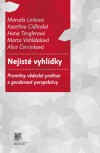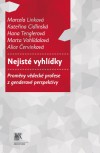Publications
Filter publications
Or use fulltext search
Živitelství představuje historicky a sociálně proměnlivý jev, který může nabývat podoby výhradního či převážně mužského anebo ženského živitelství či spoluživitelství. Kniha se zaměřuje na praxi živitelství (ale i pečovatelství) a její vymezení z perspektivy rodičů. Autorky publikace zajímá reflexe vztahu mezi živitelstvím a péčí a vnímání důsledků určitého uspořádání rodičovských rolí pro seberealizaci a možnosti uplatnění rodičů v rodině i mimo ni.
I argue in this chapter that we do not need, in STS, to be concerned with losing theory (to descriptions and stories, fieldwork, practice or politics), rather recognizing different forms in which theory is and can be practiced. Along that line, we create a space to further decenter STS theory from masculinity, professional community and the (lab) natural science epistemic order.
Počet žen, které pracují ve vědě, je nízký (25 %). ČR v tomto ohledu zaostává jak za průměrem EU, tak ve srovnání s novými členskými státy. Navíc od roku 2001 zůstává podíl vědců vůči vědkyním na stejné úrovni. V české vědě také panuje vysoká míra horizontální a vertikální segregace. Jak na tuto situaci reagují jednotlivci a instituce? Postavení žen ve vědě se pomalu stávají tématem, kterému státní, výzkumné a vědecké instituce začínají věnovat pozornost.
Z pohledu statistických údajů se situace v ČR od minulého roku nijak zásadně nezměnila, téma podpory genderové rovnosti je stále na okraji zájmu institucí výzkumu, vývoje a inovací. Dílčí pozitivní posuny nemají zásadní strukturální charakter. Netečnost místních institucí je o to zřetelnější, porovnáme-li ji s přístupem institucí v zahraničí.
Publikace se zaměřuje na představení dostupných dat, a to v časových řadách od roku 2001. Data ukazují, že neplatí předpoklad růstu podílu vědkyň v situaci, kdy se trvale zvyšuje podíl žen mezi studujícími vysokých škol a vysokoškolsky vzdělanou populací. Z osob, které mají v ČR kvalifikaci pro výkon výzkumné profese, tvoří 50 % ženy, mezi výzkumníky jich je ale jen 25,1 % (v FTE).
Despite various changes in academic institutions and the academic profession in last two decades (Shore 2008; Dunn 2003; Power 2003), the academic environment is still organized around the notion of a linear, uninterrupted career path (Murray 2000; Smithon and Stokoe 2005) culminating with the launch of one’s own lab.
Academic excellence is allegedly a universal and gender neutral standard of merit. This article examines exactly what is constructed as academic excellence at the micro-level, how evaluators operationalize this construct in the criteria they apply in academic evaluation, and how gender inequalities are imbued in the construction and evaluation of excellence.
Recenze je věnována knize Lucie Jarkovské Gender před tabulí: Etnografický výzkum genderové reprodukce v každodennosti školní třídy (2013, Praha: SLON), která je určena výzkumníkům i pedagogům, zejména základních škol - hlavním cílem publikace je přispět k rozvoji genderově citlivé výuky.
The publication explores gender aspects of researchers’ career plans, academic mobility, combination of research and parenthood, image of science in the media and gender equality policies in science. The introductory chapter discusses current changes in research and position of women in Czech science.
The publication explores gender aspects of researchers’ career plans, academic mobility, combination of research and parenthood, image of science in the media and gender equality policies in science. The introductory chapter discusses current changes in research and position of women in Czech science.
The publication explores gender aspects of researchers’ career plans, academic mobility, combination of research and parenthood, image of science in the media and gender equality policies in science. The introductory chapter discusses current changes in research and position of women in Czech science.
The publication explores gender aspects of researchers’ career plans, academic mobility, combination of research and parenthood, image of science in the media and gender equality policies in science. The introductory chapter discusses current changes in research and position of women in Czech science.
The publication explores gender aspects of researchers’ career plans, academic mobility, combination of research and parenthood, image of science in the media and gender equality policies in science. The introductory chapter discusses current changes in research and position of women in Czech science.
The publication explores gender aspects of researchers’ career plans, academic mobility, combination of research and parenthood, image of science in the media and gender equality policies in science. The introductory chapter discusses current changes in research and position of women in Czech science.
The publication explores gender aspects of researchers’ career plans, academic mobility, combination of research and parenthood, image of science in the media and gender equality policies in science. The introductory chapter discusses current changes in research and position of women in Czech science.
The publication explores gender aspects of researchers’ career plans, academic mobility, combination of research and parenthood, image of science in the media and gender equality policies in science. The introductory chapter discusses current changes in research and position of women in Czech science.











Facebook
Twitter